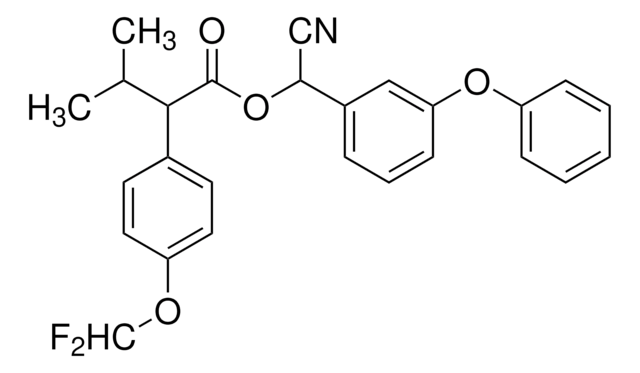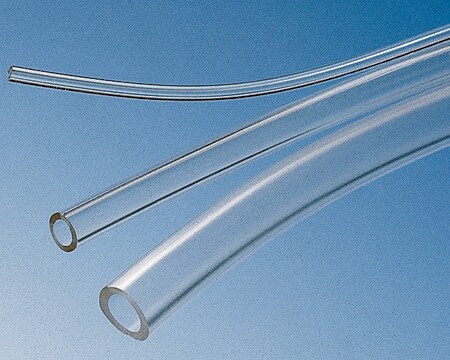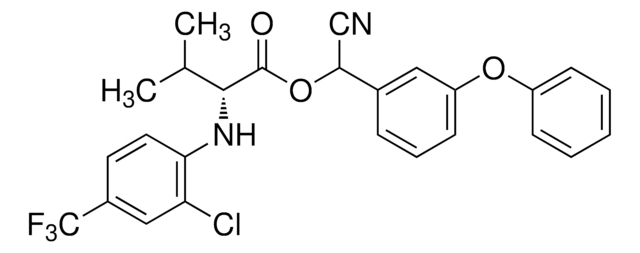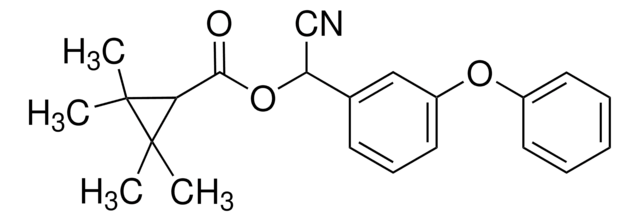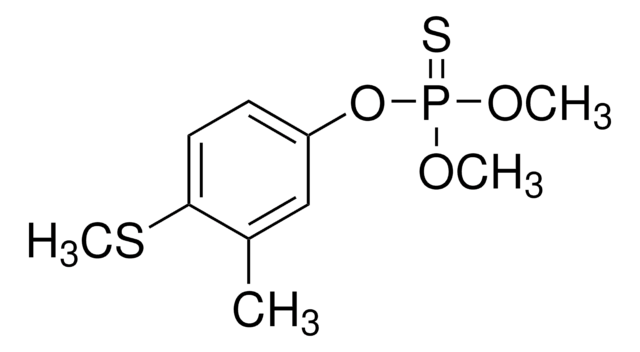CRM68471
Flucythrinate
certified reference material, TraceCERT®, Manufactured by: Sigma-Aldrich Production GmbH, Switzerland
Synonyme(s) :
α-Cyano-3-phenoxybenzyl 4-difluoromethoxy-α-isopropylphenylacetate
About This Item
Produits recommandés
Qualité
certified reference material
TraceCERT®
Niveau de qualité
Gamme de produits
TraceCERT®
Durée de conservation
limited shelf life, expiry date on the label
Fabricant/nom de marque
Manufactured by: Sigma-Aldrich Production GmbH, Switzerland
Température de stockage
2-8°C
Chaîne SMILES
CC(C)C(C(=O)OC(C#N)c1cccc(Oc2ccccc2)c1)c3ccc(OC(F)F)cc3
InChI
1S/C26H23F2NO4/c1-17(2)24(18-11-13-21(14-12-18)32-26(27)28)25(30)33-23(16-29)19-7-6-10-22(15-19)31-20-8-4-3-5-9-20/h3-15,17,23-24,26H,1-2H3
Clé InChI
GBIHOLCMZGAKNG-UHFFFAOYSA-N
Vous recherchez des produits similaires ? Visite Guide de comparaison des produits
Description générale
Certified content by quantitative NMR incl. uncertainty and expiry date are given on the certificate.
Download your certificate at: http://www.sigma-aldrich.com
Flucythrinate is a synthetic a-cyano pyrethroid insecticide that acts as a voltage gated sodium channel agonist. It finds its use to provide protection against a variety of sucking insects, beetles, and lepidoptera in cotton and pome fruits.
Flucythrinate is not approved for its use in the European Union (EU) as per the Commission Regulation (EC) No 2076/2002 of 20th November 2002 as a plant protection agent under the Regulation (EC) No. 1107/2009, repealing the directive 91/414/EEC. Flucythrinate is measured and reported along with other mixtures of its constituent isomers (sum of isomers). But a default maximum residue limit (MRL) of 0.01 mg/kg and 0.02 mg/kg is applicable for its presence in fresh/frozen fruits and tree nuts respectively according to Reg. (EU) 2015/868.
Application
The methiocarb CRM may also find use as given below:
- Development of a class selective enzyme-linked immunosorbent assay (ELISA) to screen a-cyano pyrethroids and their metabolites
- Comparison between two sample preparation techniques-dispersive liquid-liquid microextraction (DLLME) and QuEChERS-DLLME, followed by gas chromatography-electron capture detection (GC-ECD) for the determination of 10 pyrethroids from different fruit juice samples
- Multi-residue analysis of 133 pesticide residues in chenpi samples using a modified QuEChERS method and gas chromatography-tandem mass spectrometry (GC-MS/MS)
- Simultaneous determination of 78 pesticides in black tea samples using multi-walled carbon nanotubes (MWCNTs) for dispersive solid phase extraction (d-SPE) accompanied by quantification with gas chromatography-tandem mass spectrometry (GC-MS/MS)
- Development of a method based on gas chromatography-mass spectrometry (GC-MS) in negative chemical ionization mode to determine 17 pyrethroid residues in garlic, onion, spring onion, and chili samples
- Development and validation of a method for multi-residue analysis of 124 pesticides in rice samples using modified QuEChERS extraction and gas chromatography-tandem mass spectrometry (GC-MS/MS)
Informations légales
Mention d'avertissement
Danger
Mentions de danger
Conseils de prudence
Classification des risques
Acute Tox. 3 Oral - Acute Tox. 4 Inhalation - Aquatic Acute 1 - Aquatic Chronic 1 - Flam. Liq. 3
Code de la classe de stockage
3 - Flammable liquids
Classe de danger pour l'eau (WGK)
WGK 3
Point d'éclair (°F)
113.0 °F
Point d'éclair (°C)
45 °C
Faites votre choix parmi les versions les plus récentes :
Certificats d'analyse (COA)
It looks like we've run into a problem, but you can still download Certificates of Analysis from our Documents section.
Si vous avez besoin d'assistance, veuillez contacter Service Clients
Déjà en possession de ce produit ?
Retrouvez la documentation relative aux produits que vous avez récemment achetés dans la Bibliothèque de documents.
Global Trade Item Number
| Référence | GTIN |
|---|---|
| CRM68471-100MG | 4065265084109 |
Notre équipe de scientifiques dispose d'une expérience dans tous les secteurs de la recherche, notamment en sciences de la vie, science des matériaux, synthèse chimique, chromatographie, analyse et dans de nombreux autres domaines..
Contacter notre Service technique